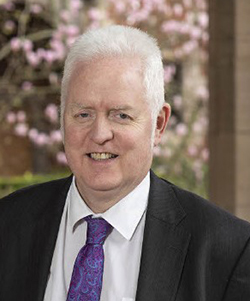Is Ireland on the cusp of a new era for e-health? David Lynch looks at recent developments
Ireland has long been seen as “behind the curve” in digital health, but is the health service nearing a turning point? Minister for Health Stephen Donnelly certainly believes so.
“My Department has significantly increased our activity in recent years to support readying our legislative and policy landscape for the implementation of the European health data space [EHDS],” the Minister told the Dáil last month.
The introduction of the EHDS regulation into Ireland is looming. EHDs will lead to a common governance framework and harmonised infrastructure for the use and reuse of electronic health information in and between EU member states.
In terms of “activity”, Minister Donnelly pointed to the publication of the Health Information Bill 2024, which will provide a legal basis for the establishment of digital health records in Ireland. He also noted the publication of Digital for Care: A Digital Health Framework for Ireland 2024-2030, which will guide strategic development and investment in digital transformation.
The HSE published its accompanying digital health strategic implementation plans following these moves from the Minister and his Department. However, funding issues have yet to be fully teased-out (see panel).
Smart Health Summit
It was against this background that representatives from medicine and the technology industry gathered for the Smart Health Summit in Croke Park, Dublin, last month. While there was much talk about coming progress, the word ‘laggard’ was used by more than one speaker to describe Ireland’s current digital landscape compared to many other developed nations.

Mr Fran Thompson, HSE Chief Information Officer (CIO), who spoke at the Summit, told the Medical Independent (MI) he believes most doctors are ready for digital transformation. Mr Thompson described the group as being “rightly impatient”.
“Most clinicians that I deal with on a day-to-day basis are really enthusiastic and want this to go faster,” he said. “They want a digital record; they understand the benefits of it. So I would say that 99.9 per cent of clinicians can’t wait for this to happen. They want it really quickly and they want it now.”
He added that the people who utilise electronic health records (EHRs) are “clinicians and the clinical support staff”.
“This is their EHR, not mine. It’s for them to provide care to patients and use the technology to support them in their job…. This is to help them deliver care safely and securely and also allows them to do academic research and other benefits.”
He said doctors are therefore key to any successful EHR roll-out.
“When you look internationally, EHRs designed… without clinicians have failed. So they [doctors] need to be at the core of the design, the build and the implementation.”
Some critics of the HSE have raised concerns over the slow pace and high projected cost of its schedule of digital development. For instance, speaking to MI in August, Prof Martin Curley (PhD), the former Head of Digital Transformation at the HSE, said he believed a national EHR system could be implemented much more quickly and at a fraction of a recently projected cost.
Asked about these concerns, Mr Thompson replied that he would agree that “things haven’t moved fast enough”.
“But part of this is that it’s an enormous change programme and it needs to be done correctly,” he said.
“So, without a doubt, it’s not fast enough, and, without a doubt, we are way behind other countries. But we are where we are, and we now need to move forward. So if we concentrate on the past, or we concentrate on what could have been done in a different way… that’s just going to distract from the real goal here, which is to get an electronic health record and digitise the health service. That’s what we all should be aiming for together.”
Doctors are “innovative by nature”, Adjunct Assistant Professor at the School of Medicine, Trinity College Dublin, Prof Sinead O’Connor, told MI. Prof O’Connor also addressed the Smart Health Summit last month
She noted that many doctors have worked abroad “so they do have that experience” of advanced digital health, “and then they wonder why we don’t have it in Ireland.”

Prof O’Connor said that there was much innovation in Ireland in terms of medical devices and other areas, but there “is a lag on the software and IT [information technology] side”. She noted that an understandable focus on hospital capacity shortfalls and long patient waiting lists may have impacted on IT development and innovation.
This has meant “we haven’t put in place the IT systems in the hospitals that other countries have done”.
She said the question is whether “inside health and outside – are we now willing to make that investment” in digital health?
Writing in the last edition of MI, IHCA Senior Policy and Research Executive, Mr Dara Gantly, said the Association welcomed the Minister’s indicative timeline for the roll-out of digital health reforms. “Crucial e-health platforms are due to come on stream this year and next, paving the way for phase three which will see the roll-out of full digitalisation across the health service.”
He noted that current deficits in the digital infrastructure are impacting consultants working with “inefficient and outdated IT systems and hardware”.
Public health
One set of doctors who have long sought IT advancement are public health doctors.
In its first ever position paper, the Irish Society of Specialists in Public Health Medicine (ISSPHM) called on health management to address “longstanding and critical” IT infrastructure gaps. These included the lack of an outbreak case and incident management system (OCIMS), an integrated surveillance system and immunisation reporting system.
Two years on from that paper, public health doctors are hopeful that they will soon experience some significant IT progress.
“We are delighted that the tender for [an] OCIMS has been awarded,” Dr Fiona Cianci of the ISSPHM told MI.
“And there are hopes of implementation next year.”
“This system will be vital to our health protection colleagues in managing incidents and for surveillance purposes.”
However, IT infrastructure challenges for the specialty remain.
“Not having a national immunisation system continues to pose huge challenges in our work. A vaccination information system is critical to improving vaccination rates across the population while ensuring patient safety, especially in the context of delivery of the catch-up vaccination programme for vulnerable migrants currently.”
A child health information system “is also critical” in order to collate and improve all the data routinely as part of the universal child health services, according to Dr Cianci.
For example, from a patient safety standpoint, she said it is essential to connect newborn blood spot screening results with immunisation records for children diagnosed with severe combined immunodeficiency.
More generally, the increased commitment to health needs assessment to guide service planning is “exposing the enormous gaps” in Irish health data, Dr Cianci added.
“Few hospitals have comprehensive electronic record systems.”
GP systems are more developed to support practice-level patient management “but are not set up to allow effective sharing and analysis of data”.
“As a result, patients are having their data collected into systems that are not capable of serving the population at a level of stewardship that might be expected. The gap compared to other countries, such as Scotland, is striking.”
But with the Department’s schedule for big changes in e-health, what is the mood of public health doctors?
“We are of course hopeful that IT advances will aid our everyday work,” said Dr Cianci. “Public health work is based on evidence and data and any IT solution which enables systematic data collection and analysis will be invaluable in our work.”
She noted that a unique patient identifier “is… key to making all the data available more relevant, specific, transferable between systems, and easy to interpret”.
“Another huge development for us would be the systematic recording of ethnicity of our service users and patients in all information systems. This would assist us in identifying population cohorts that we are not reaching with universal interventions and services and would help to tackle the health inequalities we are aiming to reduce.”
Prof Mark Lawler, Professor of Digital Health and Chair in Translational Cancer Genomics, Queen’s University Belfast, also addressed the Smart Health Summit.

He described the Government’s legislative actions, such as the Health Information Bill 2024, “as really important.”
“We are behind the curve at the moment, Europe is pressing ahead,” Prof Lawler told MI. “So, therefore, in order to push ahead to a similar level, first of all you need the legislation, then you need the will to do it.”
“Then you need the technology to get in there quickly. We have an opportunity here, really, to do something unique on the island of Ireland. I think there is an opportunity to work together in a cross-border fashion. But we need to move quickly. So that is why the legislation is really important.”
However, Prof Lawler is concerned that a “too conservative” interpretation of the EU General Data Protection Regulation (GDPR) in the Republic of Ireland, compared to Northern Ireland and elsewhere, may be a barrier to progress.
“Patients are saying what they want,” he said.
“So we need to be looking at a different interpretation of GDPR…. I’d go as far to say we need to transform the way we look at data, we need to have that public conversation. I think you’ll find, and we certainly found this in Northern Ireland and the UK, that having that public conversation with patients, [we found that] patients want their data to be used.”
He added, from a legal perspective, patients want their data utilised “both for research and for care”.
“That should be the defining factor.”
Prof Lawler reflected that cross-border co-operation is already occurring, with even greater scope for collaboration into the future.
“We need to really look at ways that we can work together… there is no need to reinvent the wheel. There are things we have done that would make sense for us both to do together and I’m very keen at looking at ways that we can do that.”
“Legislation, then implementation, is important. We need to do both.”
Shared care record
A HSE spokesperson told MI that plans for a national shared care record are still in the procurement phase. The process will not be complete until the end of 2024 or early 2025, “depending on contractual discussion with a successful vendor,” they added.
Once the contract is awarded, the design and deployment phases will begin. The HSE is targeting an initial implementation in the last quarter of next year, the spokesperson said.
Separately, according to minutes of the HSE technology and transformation committee meeting in May, members discussed issues with the HSE workforce’s digital and data skills which have “become apparent… and agreed that there is a pressing need to push upskilling in this area”.
Asked about this “pressing need”, an Executive spokesperson said the HSE recognises the potential of digital technology to transform and improve health and social care delivery and patient outcomes.
“There will be a focus on helping the workforce adopt digital health to enhance the way they work.”
To achieve this, the spokesperson said it needed to embed digital literacy across all learning and training pathways.
According to the spokesperson, it is “critical” that the HSE workforce is comfortable working with systems that are delivered and supporting new ways of delivering services.
“The HSE will support the health and social care services by providing a digitally skilled and supported workforce with appropriate digital tools and connectivity, allowing for collaborative working.”
This year will also witness the full launch of a HSE patient app that will provide people with important medical history and records.
On the new app, Mr Thompson told MI there are “two elements”: The shared care record and the app itself. He described them as “digital twins”.
“The app is really aimed at patients. To allow them access to records. While the shared care record will be both for patients and clinicians.”
He added that the app “is going to start off pretty simply”.
However, over time “patients will become, I’m hoping, far more engaged and far more educated on the data that we [HSE] hold on them. Because it is their data at the end of the day.”
Funding all the digital parts
In May, the Department of Health published its Digital for Care: A Digital Health Framework for Ireland 2024-2030. This framework sets out a plan to digitally transform health services in Ireland and improve access for patients.
In response, the HSE published its own digital health implementation roadmap.
The roadmap “recognises the need for significant and sustained investment to achieve transformational goals, including the implementation of EHRs [electronic health records], and shared care record, allowing a single point-of-access to health information for patients and staff”.
The HSE document notes to achieve this transformation “a balanced investment is crucial, not only in terms of capital, but also in the allocation of whole-time-equivalent [staff] and non-pay revenue”.
According to the HSE, the roadmap’s “success” through to 2030 “hinges
on the commitment to yearly increases in both capital and revenue funding, accompanied by a corresponding increase in staffing levels”. The workforce, data, and operational infrastructure are foundational to the initiative’s success, and as such, they are a primary focus of the investment strategy.
In the roadmap, the HSE states that it is seeking an annual digital health budget of between 4-6 per cent of the overall healthcare expenditure.
This budget, which would be inclusive of current funding, “is yet to be approved.”
Asked whether Budget 2025 had provided sufficient levels of funding, a HSE spokesperson told the Medical Independent that the “Letter of Determination is not yet available, therefore, the budget is not finalised at this stage”.
The spokesperson reiterated the need for the funding increase specified in the Digital for Care 2030 framework.
The spokesperson said the current level is approximately 2.6 per cent, which has grown in recent years. This is made of a capital and revenue allocation to support digital programmes, they added.
“The Digital for Care framework projected that this investment would need to increase on a graduated basis in the years between 2024 and 2030. The method for securing funding is through the service planning based on programmes of work which are outlined in the implementation roadmap. This is reviewed and agreed each year.” The Department said that Budget 2025 brings further investment of €23 million into digital health. This will fund the roll-out of the patient app, development of shared care record, investing in the development of the EHR, and also allow for digital measures to “boost capacity and enable productivity”.













Leave a Reply
You must be logged in to post a comment.